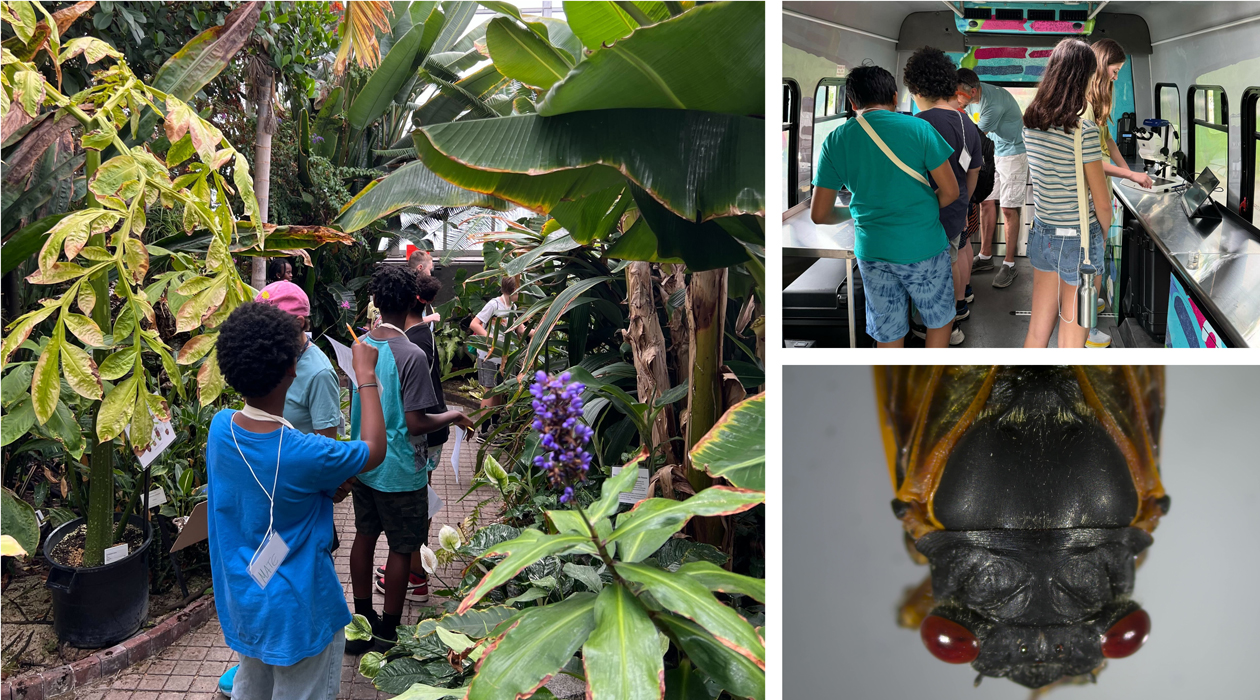For middle schoolers at Pollen Power camp, curiosity blooms

Campers practice identifying plants in the Conservatory Greenhouse on campus (left), and imaging plant and insect specimens on the mobile lab bus (top right). The bottom right shows a cicada viewed through a microscope. / Julia Pollack, Core Facilities
Plants are diverse organisms capable of communication, self-defense, and forming cooperative partnerships with insects; yet these remarkable abilities are often overlooked in the bustle of everyday life. At Pollen Power summer camp, however, middle school students dive into this fascinating world of plant and pollinator interactions, bringing these hidden wonders to light.
Hosted by the Carl R. Woese Institute for Genomic Biology, Pollen Power has been transforming the way young minds see the world around them since its inception in 2013. The camp provides a dynamic learning environment filled with a blend of hands-on learning and scientific exploration, that encourages campers to see the world through the eyes of a scientist.
“At Pollen Power, students take something they consider an ‘ordinary everyday thing’ in nature and learn to see it in a new light,” said Sarah Choi, the IGB’s Outreach K-12 Project Manager and lead organizer of Pollen Power camp. “They start to appreciate the plants and pollinators around them. And through our activities and experiments they leave feeling like scientists, with more curiosity about the world around them.”
The camp, funded by the Center for Advanced Bioenergy and Bioproducts Innovation theme within the IGB and the Champaign Unit 4 School District, welcomed 4th-8th graders this year from June 3rd-7th. Throughout the week, campers engaged in various activities designed to teach them not only about plants and pollinators, but also teamwork, communication, and scientific observation.
In line with Pollen Power tradition, campers broke into small groups mentored by Franklin STEAM Academy staff, and designed and conducted week-long experiments to observe the growth rates of cress seeds under different conditions, such as varying liquids, temperatures, and light exposure. Predictably, seeds given water and sunlight flourished the most, offering practical insights into plant care and environmental factors.
Besides their experiments, the week’s itinerary was packed with diverse and engaging activities, featuring many exciting additions that were new to the camp this year. One highlight of this year's camp was the celebration of the simultaneous emergence of both the 13-year and 17-year cicadas, during which campers collected cicadas and learned the art of insect pinning. This hands-on activity connected the campers to a rare and spectacular natural event, enriching their appreciation of the insect world.
In addition, this year’s camp featured a new storytelling session with children’s author Janice Harrington, who read from her book Rooting for Plants. This session engaged the campers’ imaginations and helped to deepen their connection to plant life and their community. Another standout event was a talk by Todd Krone, co-founder and CEO of PowerPollen, a company innovating in the field of pollen collection and preservation for agriculture. Krone's presentation on pollen biology was followed by an interactive activity, giving campers a glimpse into the exciting applications of pollen science in modern agriculture.
The IGB’s new mobile lab bus also made its debut at Pollen Power. Using the bus's advanced equipment, campers were able to examine and image plants and insect specimens they had collected from a nearby prairie. Campers also toured Prairie Fruit Farms, where they experienced firsthand how local agriculture integrates with natural ecosystems. The farm features goat pastures, organic fruit orchards, and restored prairie, emphasizing the connection between plants, pollinators, and sustainable farming practices.
Throughout the week, the campers explored state-of-the-art facilities in the IGB Core, where they used confocal microscopes and 3D imaging to visualize different pollen particles and reconstruct plant images. They also crafted art from the plants they gathered, creating watercolor paintings with chlorophyll dye they had extracted, and transferring the colors of petals and leaves onto bandanas through hammering.
By the end of the camp, it was evident that campers had gained a profound appreciation for the plants and pollinators in their environment. Through activities, tours, and expert interactions, Pollen Power provides a rich and varied learning experience that aims to inspire the next generation of scientists.
